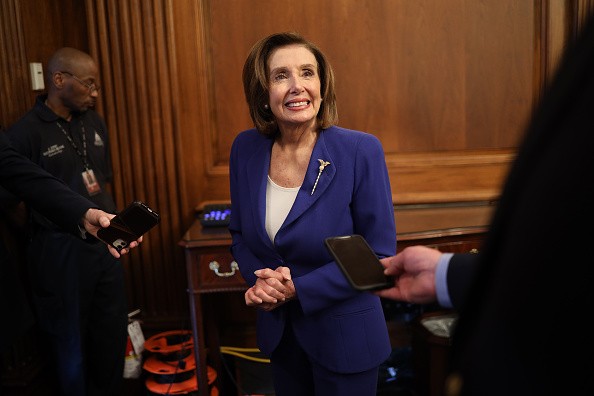Next Stimulus Package: Here's All the Benefits You Could Receive If Congress Makes a Deal
Both Republican and Democratic lawmakers have been rushing to strike a deal on the next stimulus package.
For those who will meet eligibility requirements, there will be up to a $1,200 stimulus check to head your way once the pending proposals are approved. However, officials who hold the decision to release the next stimulus checks have been split along partisan lines about how the program could affect the economy.

The Hill reported that the negotiators met for three hours on Thursday night, but there were no results yet. Speaker of the House Nancy Pelosi said, "We're very far apart. It's most unfortunate." She also added that the current proposal is "not enough money for money in the pockets of the American people."

Treasury Secretary Steven Mnuchin told reporters if lawmakers cannot conclude and compromise on significant issues by Friday, President Donald Trump is looking at issuing executive orders as an alternative. Mnuchin also echoed Pelosi in describing the camps as divided on substantial matters.
The next stimulus rescue package will include another direct payment and a range of financial aid that will benefit hundreds of millions of Americans before the end of 2020. So far, here are the proposed benefits that the qualifiers may get if Congress makes a deal in the final relief bill:
Aims to accelerate spending
Qualified individuals and families will receive a stimulus payment based on annual income, dependents, age, and other factors. The first stimulus checks under the CARES Act had problems. And after three months, the recipients are still waiting for their payment. The next stimulus payment is not taxable, and you can use it wherever you need it to spend, such as house expenses, clothing, food, and so on.
The House of Representatives' Heroes Act called for $1,200 stimulus checks for more people this time. Meanwhile, the White House supports another round of stimulus and likely a part of the final bill.
More unemployment benefits
The first stimulus also included additional weekly checks for people who applied for unemployment. The program was granted by the CARES Act, providing an extra $600 per week that expired on July 31. But officials are seeking another unemployment boost.
Democrats supported the extension of the $600 rate and balked at the Senate proposal, which would extend the benefit based on the 70 to 75 percent of the total lost wages. On the other hand, Republicans support the idea to continue but at a reduced rate.
According to the NY Times, after the political stalemate, the GOP negotiators reportedly signaled their willingness to consider the $600 weekly allowance.
Employee retention tax credit
An employer can receive refundable tax credits under the program. The employer can refund the wages paid to an employee during the pandemic. However, the program isn't a direct payment to the employer. Instead, the employer encourages to keep workers on the payroll through the program.
Return-to-work payment of as much as $450 per week
Senator Rob Portman, a Republican from Ohio, proposed the bonus of as much as $450 a week. The next stimulus program attempts to provide temporary weekly bonuses for unemployed workers to secure a new job or rehire on top of their wages.
In May, the White House expressed interest in the proposal, and Portman continued the idea. However, Portman's proposal is not part of Senate Majority Leader Mitch McConnell, and other Republican senators' proposals presented last week.
Payroll Protection Program
This program is intended to retain your job. The Paycheck Protection Program (PPP) provides forgivable loans to small businesses to keep employees on the payroll during the COVID-19 pandemic. The PPP got off to a rocky start as it did not meet the goals set for it by Congress.
Senator Susan Collins of Maine said the Republican proposal would target the hardest-hit, the small businesses.
Payroll tax cut
Trump pushed the idea of including temporary payroll tax cuts for months. This proposal is to give a person more money in the bank this year. The next stimulus package proposal may include cutting both employee and employer's share of payroll taxes.
Rental assistance
The rental assistance would help the renters pay rent and assist landlords with their expenses despite less rent money coming in.
The program would help qualified renter pay rent temporarily. They would also be safe from evictions for a year and help cover rental property owners' costs.
The House Democrats included the eviction moratorium in the HEROES Act. However, Trump earlier said the eviction protections would be part of the program. Congress is looking to extend the separate program while it works on the final bill with unemployment insurance.
Check these out:
$1,200 US Stimulus Mistakenly Send to Foreign Workers Living Overseas
Will You Receive Your Next Stimulus Payment Sooner Than You Think?
Trump Weighs Signing Executive Order on Next Stimulus If Congress Fails to Act by Friday
Subscribe to Latin Post!
Sign up for our free newsletter for the Latest coverage!
















